The European Commission’s humanitarian arm tried and failed to head off steep reductions in the commission’s development budget last year, arguing internally against the “dramatic and disproportionate cuts for countries in situations of crisis or fragility.”
Commission documents, obtained by Devex through an access to information request, show DG ECHO — the directorate-general responsible for humanitarian aid — at first blocked the proposal altogether, putting it at loggerheads with the Directorate-General for International Partnerships, or DG INTPA, the development branch of the European Union executive.
In the end, INTPA won.
Printing articles to share with others is a breach of our terms and conditions and copyright policy. Please use the sharing options on the left side of the article. Devex Pro members may share up to 10 articles per month using the Pro share tool ( ).
Search for articles
Most Read
- 1
- 2
- 3
- 4
- 5








